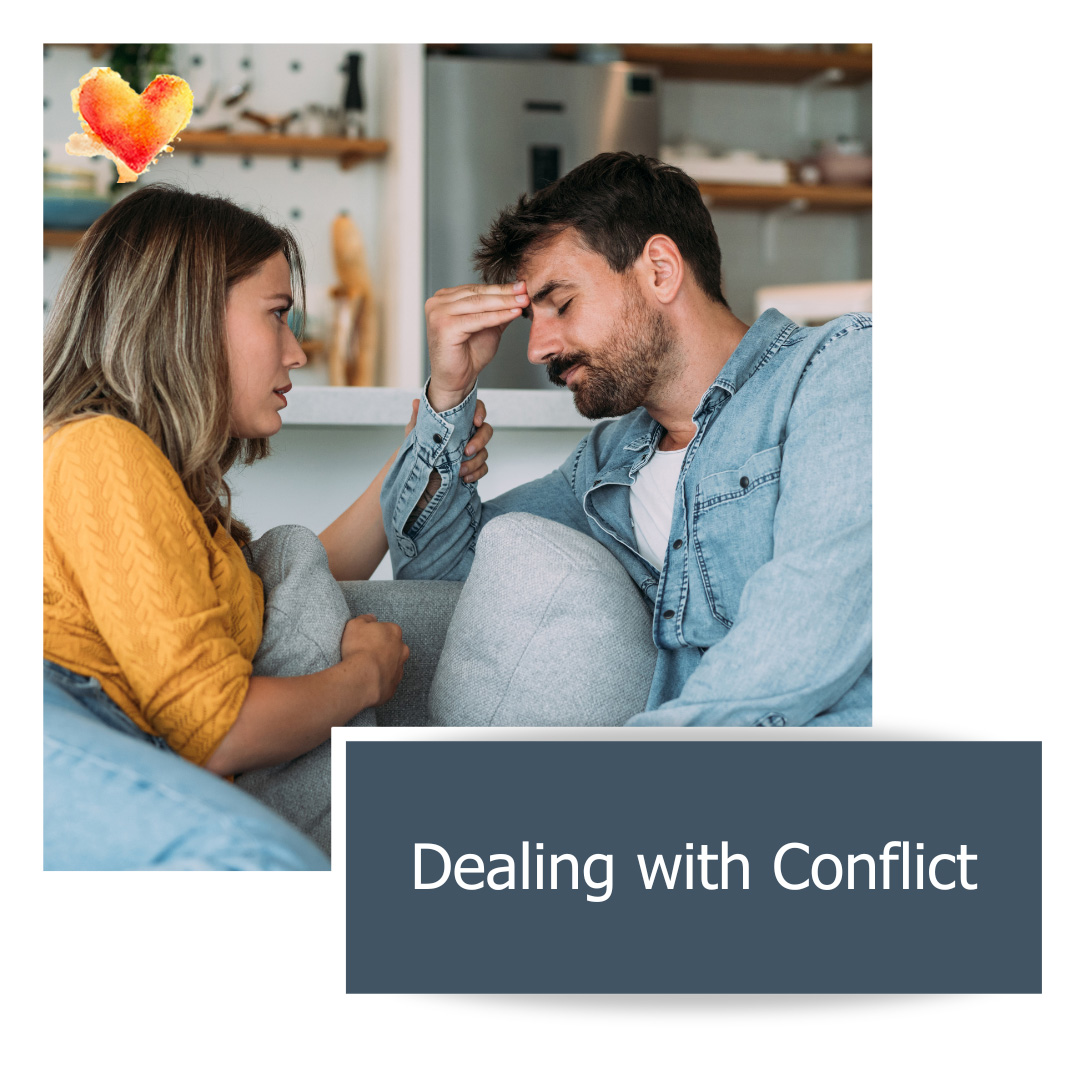Conflict is inevitable in every relationship. Psychologist Dan Wile says it best in his book After the Honeymoon: “When choosing a long-term partner, you will inevitably be choosing a particular set of unresolvable problems.” However, Dr. Gottman has found that nearly 1/3 of all conflicts can be resolved with the right approach.
The popular approach to conflict resolution, advocated by many marriage therapists, is to put yourself in your partner’s shoes, listen to what they say, and communicate with empathy that you understand their perspective. It’s a decent method if you can do it.
But most couples can’t. Even happily married couples. After studying couples for the last 40 years, Dr. John Gottman has recognized that even happy couples do not follow the experts’ rules of communication.
By studying what these couples did, Dr. Gottman developed a new model for solving your solvable problems in an intimate relationship.
Step 1: Soften Your Start-Up
How a conversation starts predicts how it will end. Watch how a harsh start-up influences this conversation:
Kim: Once again, I come home from work and have to pick up after you. (criticism)
Kris: Here we go again. I’m such a slob, right? I clean the kitchen counters all the time.
Kim: Then why do I have to remind you to clean the dishes in the sink or take out the trash? It’s frustrating when our house smells disgusting! Don’t worry about it today. I already did it, or were you too busy browsing Facebook to notice? (contempt)
Kris: Hey. Come on. I hate cleaning. I know you do, too. I have an idea. (repair attempt)
Kim rolls her eyes. (more contempt)
Kris: I think we need some connection. Let’s take a vacation so you can be waited on?
Kim: Seriously? We can’t afford a maid, much less a vacation.
A harsh start-up begins with the Four Horsemen and causes flooding and increased emotional distance that can strain the marriage.
Soft start-ups do not contain the Four Horsemen. When a partner starts the conversation gently, it communicates respect and causes both partners to feel positive about themselves and their marriage.
Here are some suggestions to ensure your start-up is soft:
- Take responsibility. “I share some responsibility for this…”
- Complain without blame and state a positive need. “Here’s how I feel…about a specific situation and here’s what I need…” (positive need, not what you don’t need)
- Start with “I” instead of “You.” I statements are less critical and don’t make the listener as defensive as “you” statements.
- Describe what is happening. Don’t judge or blame. Communicate what you see will help your partner from feeling attacked.
- Be polite. Use “please” and “I would appreciate it if…”
- Be appreciative. Recognize what you appreciate in your partner.
- Don’t let things build up. If you do, it’ll escalate in your mind until you blow-up.
The secret to avoiding harsh start-ups is to work on the first four principles in The Seven Principles for Making Marriage Work. If your spouse tends to start conflicts harshly, make sure they are feeling known, respected, loved, and that you are willing to accept influence. So pay attention to minor bids for connection.
When “It’s your turn to take out the garbage, can you take it out please?” is ignored, your partner’s request may escalate to “What is wrong with you? Are you deaf? Take out the garbage.”
If you go straight for the jugular, you’re going to get either war or retreat on your partner’s part instead of a productive discussion. See how a softened start-up compares.
Kim: I feel like our house is a mess and we’re having family over tonight. (describing) I’m angry cause I feel like I am doing all the cleaning by myself. I should have asked sooner (taking responsibility). I need you to help me vacuum the living room? (positive need).
Kris: I understand. I hate cleaning up too and I’d be willing to vacuum and even clean the bathroom for you.
Kim: You’re such a big help. (appreciation). Thank you love. (politeness)
Kris: After the family is gone, let’s go out for our favorite ice cream!
Kim: I’m so in!
Step 2: Learn to Send and Receive Repair Attempts
When Kris said, “I clean the kitchen counters all the time” Kim could have said, “You’re right, you do.” Doing this would have been a repair attempt and de-escalated the tension, allowing Kris to be more receptive to finding a solution.
Think of a repair attempt as slamming on the brakes when you see a red light. You do this to avoid a collision that could harm your marriage.
The difference between stable, emotionally intelligent marriages and unhappy ones is not that repair attempts are better, but that the repair attempts get through to the spouse. Repair attempts require two people – the person offering the repair and one accepting it.
Repair attempts often start before a repair is made. It is dependent on the state of the relationship. Happy couples send and receive repair attempts with ease. In unhappy marriages, even amazing repair attempts fall on deaf ears.
Sometimes repair attempts seem negative, “That’s not what we are talking about” or “Stop! This is getting out of control.” If your relationship is swimming in an ocean of negativity, repair attempts will be difficult to hear.
In The Seven Principles That Make Marriage Work, Dr. Gottman has a list of repair attempts that may feel unnatural at first but provide you the vocabulary to naturally repair conflict before it harms your marriage. I’d recommend starting with a low-intensity conflict when practicing repair attempts to help you resolve an issue in your marriage.
Step 3: Soothe Yourself and Each Other
In unstable marriages, conflict discussions can lead to flooding, which make repair attempts physically impossible to hear. If you or your partner feel flooded, take a 20-30 minute break and focus on the positives of your relationship by yourself. This “forced” relaxation will do wonders for your marriage.
I recommend learning how to soothe each other. Ask yourself and each other the following questions:
- What makes us feel flooded?
- How do we bring up issues or complaints?
- Do we hold things in, rather than share them? If so, why do you think that is?
- When you feel flooded, is there something I can do to soothe you?
- How do you think you could soothe me when I feel flooded?
- What signals can we send each other when we feel flooded so we can take breaks and soothe each other?
Step 4: Compromise
Compromise is the only way to solve marital problems. Compromise is not one person changing. It’s about negotiating and discovering ways to accommodate each other. Compromise is impossible unless you accept your partner’s flaws. Marriages can be weighed down by the “if only…” my partner was richer, sexier, or more emotionally expressive. Unlike cherishing your partner, which nurtures gratefulness for what you have, “if only” nurtures resentfulness towards your partner. This makes conflict impossible to solve.
Compromise is about accepting influence from your partner. Research shows that men tend to struggle with this more than women. If you are willing to accept influence, working with each other becomes way easier.
Step 5: Address Emotional Injuries
Arguments can leave emotional wounds even when a couple resolves an issue. This is perfectly normal and requires talking about or “processing.” Sometimes it’s about how you were fighting, not what you were fighting about Dr. Gottman has a powerful exercise on page 188 in The Seven Principles for Making Marriage Work that will help heal these emotional injuries.
Mastering these general problem-solving skills will lead you to discover that many of your problems will find their own solutions. Once you can overcome the barriers that have prevented clear communication, difficulties are easier to resolve. But remember: these solutions work only for problems that can be solved. If compromise seems impossible, then the problem you are struggling with is likely perpetual.
If you want more learn more about how approaching arguments the right way to help you solve your solvable problems and manage the perpetual ones, subscribe below and get your free copy, A Better Way to Fight.










